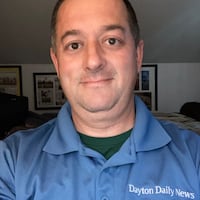Everyone knows the rest of the story. The Dragons sold out every game of the first season in 2000 before a pitch was thrown. The sellout streak reached 815 games in 2011, breaking the professional sports mark formerly held by the Portland Trail Blazers. The streak, now at 913 games, continues, and there’s no end in sight. The Dragons ranked third out of 160 teams in 2012 with an average attendance of 8,352.
The Dragons have become a model of success for the Dayton community and for all of minor league baseball. Last month, they won the John H. Johnson’s President’s Award, which annually recognizes the most complete franchise in Minor League Baseball.
All these years later, Murphy and Deutsch, sent by Mandalay Properties to run the new team, and Gary Mayse, the franchise’s three top front-office executives, are still here.
“You never have the opportunity to build something from the ground up,” said Deutsch, the executive vice president. “That was alluring.”
The Dragons didn’t win the President’s Award only for what they did in 2012. It’s an honor that has been years in the making, and it all started well before the first shovels of dirt were turned between Monument Avenue and First Street.
“When we first started coming here, I was enthusiastic about the project,” said Murphy, the team president. “I would go to speak to different groups, and at the end, I would ask, ‘Are there any questions?’ People would just gang up on us. ‘What makes you think people are going to come downtown? People haven’t gone downtown for 20 years. It’s not safe. There’s no parking.’ People had their minds made up. Everyone now says, ‘This is great,’ but when we started it was 50-50.”
Even today, Murphy hears from fans who tell him they never thought the Dragons would succeed. Now for 13 seasons, the franchise has been a downtown anchor and a major attraction for the city, said Sandy Gudorf, president of the Downtown Dayton Partnership.
“It brings all kinds of people downtown,” she said. “It negates many of the perceptions about downtown. It’s been an economic benefit to our restaurants before the games and clubs and other venues. On a larger scale, it’s just a feel-good story for our community.”
The first step was getting the team here.
Juvenile Court Judge Anthony Capizzi was one of the early proponents of bringing baseball to Dayton. As early as 1990, the Dayton Daily News had a story about Capizzi, then a city commissioner, promoting his baseball plan to city to businesses and community groups.
“I always knew baseball would succeed,” Capizzi said. “I never could have imagined they would sell out every game from day one.”
The continuity in the Dragons’ front office is one reason for the franchise’s success, Capizzi said. The overall affordability of the Dragons game is another. When he was pushing for a team to come to Dayton, he wanted fans of every economic background to find their way to the games.
Dragons games have remained affordable. Murphy said a lawn ticket cost $5 in 2000 and costs $7 today. The Dragons keep pushing tickets of all types, no matter the length of the streak, and describe themselves as paranoid marketers. They’re never satisfied until the tickets are gone.
The quality of the baseball often doesn’t have anything to do with the ticket sales. Dayton finished last in the Midwest League in 2012 a year after leading the league in wins in the second half. Of course, it sold out every game both seasons.
“They produce a quality product that’s not just about sports,” said Dr. Michael Ervin, co-chairman of the Downtown Dayton Partnership. “Essentially what they’ve done is produce an entertainment venue that is a lot of fun for people of all ages.”
U.S. Rep. Mike Turner, who was mayor of Dayton from 1993-2001, still goes to games and enjoys them for just that reason.
“Watching the families is probably the neatest thing for me,” Turner said. “You’re creating bonds and memories in a way that we just didn’t have before. The team has earned the support of the community.”
The Dragons work hard to establish that support. The Hometown Heroes program, in conjunction with the Dayton Development Coalition, honors service men and women. The Home Run for Life program honors children who have overcome life-changing medical conditions.
Those are just two examples.
“The Dragons have made a real commitment to the community,” said two-time Heisman Trophy-winning running back Archie Griffin, a part owner of the team. “You look at the Community All-Stars program where they recognize Dayton residents who are doing good things in the area. There’s the MVP program with the fourth and fifth graders who are awarded tickets. They just know how to make it a great affair.”
There’s no doubt the Dragons’ connection to the Reds has served it well. The current big-league team, which made the playoffs last season and looks to be a strong contender for the World Series in 2013, features a who’s who list of recent Dragons: from Votto to All-Star right fielder Jay Bruce to ace Johnny Cueto to third baseman Todd Frazier, one of the top rookies in 2012.
The first Dragons team, which featured future Reds stars Adam Dunn and Austin Kearns, showed fans right away what they would get in Dayton.
“They watch all the young players come though the system, and they can relate to them,” said Freddie Benavides, the first Dragons manager and now the infield coordinator for the Reds’ minor league teams. “They know who they are. They see them in the early stages of development and finally see what they do at the Major League level. We’ve had some good years and some tough years, but it’s about development. These fans go to watch the games and realize that.”
About the Author
